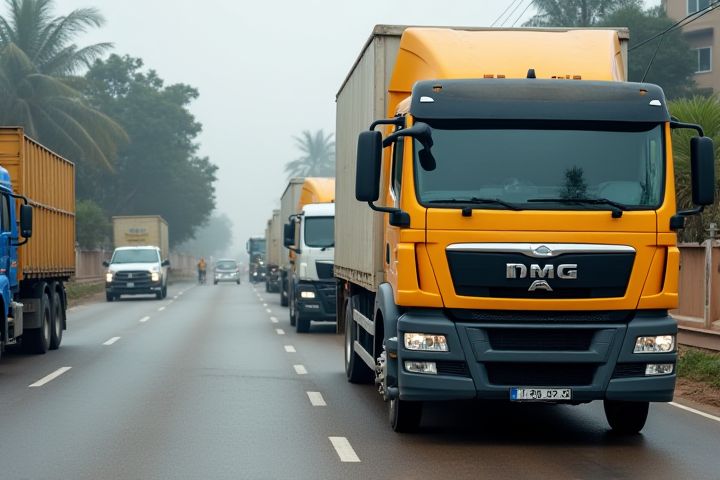
Transportation in Nigeria faces significant challenges, including inadequate infrastructure, traffic congestion, and limited access to reliable public transport. Poorly maintained roads lead to accidents and increase travel time, affecting both personal and commercial activities. In urban areas, the reliance on informal transport services, such as okadas (motorcycle taxis) and kekenapep (tricycles), highlights the inadequacies of the formal transportation network. Lack of efficient rail systems further complicates the movement of goods and people across the country. For travelers and businesses alike, navigating these obstacles requires careful planning and an understanding of the local transport dynamics.
Poor infrastructure
Poor infrastructure in Nigeria significantly hampers transportation efficiency, making it difficult for goods and people to move across the country. Key road networks suffer from neglect and degradation, leading to increased travel times and higher vehicle maintenance costs. Additionally, inadequate public transport options further exacerbate these issues, leaving many citizens reliant on expensive and unreliable private transportation. Investing in modern roadways, rail systems, and public transit solutions is essential for enhancing connectivity and stimulating economic growth throughout Nigeria.
Traffic congestion
Traffic congestion in Nigeria is a significant issue affecting urban mobility, particularly in cities like Lagos and Abuja. With over 20 million residents, Lagos experiences some of the worst traffic delays, averaging around 3 hours of travel time during peak hours. Poor infrastructure, inadequate public transportation systems, and a high number of vehicles contribute to the persistent gridlock, impacting economic productivity and increasing air pollution. As Nigeria's population continues to grow, addressing these transportation challenges is crucial for improving the quality of life and fostering sustainable urban development.
Inadequate public transit
In Nigeria, inadequate public transit systems significantly impact urban mobility and economic growth. Major cities like Lagos and Abuja struggle with overcrowded buses and a lack of reliable rail networks, leading to increased traffic congestion. Many residents rely on informal transportation methods, such as motorcycle taxis and shared minibuses, which often lack regulation and safety measures. Improved infrastructure investment and policy reforms are essential to enhance public transit accessibility and efficiency, ultimately supporting sustainable development in the region.
High accident rates
High accident rates in Nigeria stem from a combination of poor road infrastructure, inadequate vehicle maintenance, and driver negligence. Statistics reveal that Nigeria has one of the highest road traffic mortality rates in Africa, with thousands of lives lost annually due to preventable accidents. Factors such as the lack of proper signage, pothole-ridden roads, and overloading contribute significantly to unsafe driving conditions. To enhance road safety and reduce fatalities, a concerted effort is needed, including stricter enforcement of traffic laws and community awareness campaigns.
Fuel scarcity
Fuel scarcity in Nigeria has created significant transportation challenges, affecting both urban and rural areas. The lack of readily available petrol leads to increased prices for transportation services, resulting in economic strain on commuting citizens and businesses alike. Long queues at fuel stations exacerbate delays in logistics and public transport, causing frustration among travelers. As Nigeria's economy relies heavily on road transport, addressing fuel supply issues is essential for enhancing mobility and ensuring efficient trade routes.
Vehicle importation costs
Transportation challenges in Nigeria are significantly driven by the high costs associated with vehicle importation, which can strain individual and business budgets. Import tariffs, shipping fees, and currency fluctuations contribute to the overall expense, making it difficult for many citizens to access reliable transportation. The limited domestic vehicle manufacturing capacity exacerbates this issue, leading to increased reliance on imported cars. In navigating these challenges, you may consider exploring alternative transport solutions, such as public transit or locally manufactured vehicles, to improve mobility while managing costs.
Lack of urban planning
Transportation challenges in Nigeria stem largely from inadequate urban planning, which has led to overcrowded roads and inefficient public transport systems. In major cities like Lagos and Abuja, rapid population growth exacerbates congestion, making daily commutes increasingly difficult. Poor infrastructure, limited bus transit options, and minimal investment in rail networks further hinder mobility and accessibility for residents. To improve transportation efficiency, Nigeria needs to prioritize comprehensive urban planning, focusing on sustainable transit solutions and actionable policies.
Limited rural access
Limited rural access remains a significant transportation challenge in Nigeria, hindering economic growth and development. Poor road infrastructure often isolates communities, affecting access to essential services like healthcare and education. Furthermore, inadequate public transportation options contribute to social inequities, making it difficult for rural residents to participate in broader economic activities. Addressing these issues requires targeted investments in infrastructure and transportation systems to enhance connectivity and accessibility for all Nigerians.
Regulatory issues
Transportation challenges in Nigeria are significantly influenced by regulatory issues that often hinder efficiency and safety. The lack of consistent policies leads to fragmented infrastructure development, affecting road quality and public transit systems. Additionally, unregulated commercial vehicles create unsafe conditions for passengers and drivers alike. Addressing these regulatory barriers is essential for improving transportation and promoting economic growth in the country.
Rising transportation costs
Rising transportation costs in Nigeria significantly impact both individuals and businesses, leading to increased prices for goods and services. Factors such as fuel price fluctuations, inadequate infrastructure, and traffic congestion contribute to the escalating expenses associated with traveling and freight services. Urban areas like Lagos and Abuja experience severe bottlenecks, further exacerbating delivery times and operational efficiency for companies. As a result, these challenges necessitate innovative solutions to improve logistics, reduce costs, and enhance overall mobility across the nation.
